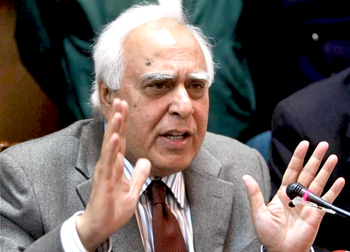 New Delhi, Dec 30: Union minister Kapil Sibal on Sunday alleged that the pain reflected in Narendra Modi's blog over the 2002 Gujarat riots was aimed at electoral gains during the 2014 Lok Sabha elections.
New Delhi, Dec 30: Union minister Kapil Sibal on Sunday alleged that the pain reflected in Narendra Modi's blog over the 2002 Gujarat riots was aimed at electoral gains during the 2014 Lok Sabha elections.
Sibal claimed that it was "too late" for BJP's prime ministerial candidate to say that Gujarat riots had shaken him to the core, arguing that the "riots baggage" will remain with Modi.
"Modi's riots baggage will remain. It is too late for him to express that he was shaken to the core. Had that been so, the core would have reacted in time, not a belated reaction just before the Lok Sabha elections," Sibal said.
In his blog, Sibal said 11 years was too late to express pain and agony for BJP's PM candidate.
"This pain and agony reflected in Modi's blog is for an audience whose sympathy will be vital in May 2014," Sibal said.
The minister argued that pain was heartfelt, spontaneous and an emotion that is expressed without calculation.
"Pain can never be a belated reaction after 11 years of silence. And a person who suffers in silence cannot remain silent for 11 years. While I do not want to be cynical in my comments, I do not want to be dishonest either. This act of liberation does not connect us with the real Modi," he said.
Sibal was responding to Modi's blog post in which BJP leader had said he was "shaken to the core" and the court verdict made him feel "liberated and at peace". He termed the post-Godhra riots as a "crippling blow to an already shattered and hurting Gujarat".
Referring to Modi's blog, Sibal said that he wondered which sisters and brothers the Gujarat CM was addressing when he talked about his personal pain.
"The sisters and brothers of those who lost their lives needed the healing touch and, that too, immediately after the riots, Sibal said, adding that "11 years is too late".
The minister said that it is the "harrowing ordeal" of the victims, and not that of Modi, that needs attention. The wisdom of the scriptures should have dawned on Modi in 2002, not in 2013, he further stated.
"Those who plan in solitude never suffer pain in solitude. Those who believe in Newton's Laws of Motion do not wait for 11 years to react," Sibal said.
He also questioned Gujarat government's stance in cases related to the 2002 riots.
"Where was the pain when the state defended those who now stand convicted, when affidavits about their innocence were filed in courts and lawyers were paid for defending the indefensible?
"Where was the pain when the state did not reach out to those crying for help and those seeking justice and when the state was collaborating with the accused to settle their affidavits, while being prosecuted in court?"





Comments
Add new comment